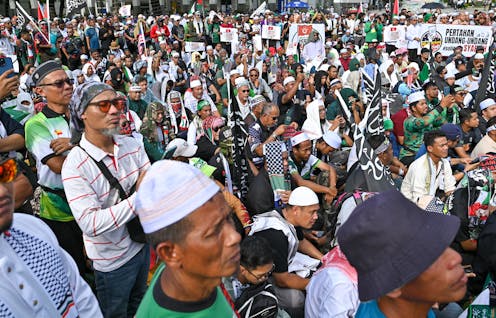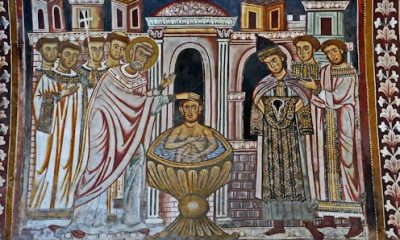
Malaysian Islamists rally in favor of sharia law on Nov. 20, 2023. Zahim Mohd/NurPhoto via Getty Images
I hadn’t expected my book tour in Malaysia to end with a confrontation with men who identified themselves as police in a Kuala Lumpur airport.
I arrived in the Muslim-majority country in early January 2024 to promote the Malay translation of my book “Islam, Authoritarianism, and Underdevelopment,” an academic analysis of the political and socioeconomic crises facing many Muslim societies today.
But my visit attracted unwarranted attention. Some conservatives and Islamists labeled me in social media a “liberal” – a term used by Malaysia’s federal agency administering Islamic affairs to denote those against the official religion, Sunni Islam. This was followed by the cancellation of my book launch event.
Nonetheless, I continued my program of other talks. Two men who identified themselves as police officers came to my last event and questioned my publisher.
The following day, the same men interrogated me and tried to seize my passport in Kuala Lumpur International Airport as I was due to embark on a flight to Pakistan. Concerned over my safety, I canceled a series of talks planned for Lahore and Islamabad and returned home to the United States.
When the incident became national news, Malaysia’s police inspector-general denied that officers were sent to confront me. Yet, a human rights group has called for a more thorough investigation into my case.
As a scholar of religion and politics in comparative perspective, I don’t see my ordeal as an isolated example of religious intolerance in Muslim-majority countries. Instead, it taps into something wider.
My research shows that there is a rising global trend against dissenting and minority religious views. Analyzing this trend is crucial to understand why right-wing populist leaders are now ruling diverse countries, such as Turkey, Russia, Israel and India, and how they may come to power in other places, including the United States.
All these countries have recently experienced the combination of three movements: religious conservatism, nationalism and populism.
Religion and nationalism: Old enemies, new allies
In both Christian and Muslim history, nationalism emerged in reaction to the religious establishment. Scholars of nationalism such as Benedict Anderson explain its origins in Europe after the 16th century by the expansion of vernacular languages, national churches and nation-states at the expense of Latin, the Vatican and divinely ordained dynasties.
Similarly, in many Muslim-majority countries, there was a tension between Islamists and nationalists. The Islamists pushed for traditional religious education and Islamic law, and emphasized global Islamic identity. Nationalists, however, modernized schools, established secular laws and stressed national identity.
This tension continued throughout the 20th century in Turkey, where nationalists led by Mustafa Kemal Ataturk founded a secular republic in the 1920s. There was a similar struggle in Egypt between the Islamist Muslim Brotherhood and the nationalist military officers who built the republic under the leadership of secularist Gamal Abdel Nasser in the 1950s.
Today, however, religious and nationalist forces are often political allies. For a decade, such an alliance has existed in Russia between the Orthodox Patriarch Kirill and President Vladimir Putin. Laws punishing insults to religious feelings have been expanded, and Orthodox Christian values returned to school curricula.
Analysts define Kirill’s strong support for Putin’s invasion of Ukraine as a reflection of the nationalist ideology they share.
In Turkey, the main religious authority is Diyanet, a government agency that controls mosques and pays the salaries of their imams. Although the Diyanet was established by Ataturk to serve secular nationalist policies, it has become an important pillar of President Recep Tayyip Erdogan’s government, which mixes Islamism with nationalism. While Erdogan’s Justice and Development Party represents Islamism, its coalition partner for a decade, Nationalist Action Party, has an explicitly nationalist agenda.
In the Arab world, there was a wrangling between Nasser’s secular nationalist Egypt and the Islamic state of Saudi Arabia in the 1950s and 1960s. No longer. Egypt, which has moved to Islamism with a constitution referring to sharia as the source of law since 1980, and Saudi Arabia, which has recently become less Islamist and more nationalist through Crown Prince Mohammed bin Salman’s reforms, are now regional allies.
The age of populist leaders
What explains this transformation in the relationship between religion and nationalism? I believe that populism is the glue that brings them together.
Populists often claim that they are defending “the people” against both elites and minorities, especially immigrants.
Recently, populist nationalist leaders have used religious symbols to mobilize their followers. For example, in 2016, Putin established an Orthodox Cathedral in Paris on the banks of the Seine River, near the Eiffel Tower. And in 2020, Erdogan declared the Hagia Sophia a mosque again – it had been a church for over a millennium until the Ottoman conquest of Istanbul in 1453 and a mosque for about 500 years until Ataturk made it a museum.
Most recently, on Jan. 22, 2024, India Prime Minister Narendra Modi inaugurated a Hindu temple in Ayodhya on the site of a mosque that had been built in 1528 but violently destroyed in 1992 by Hindu radicals, after a century of controversies over the land.
Indian Prime Minister Narendra Modi opens a Hindu temple in Ayodhya, India.
A man walks in a white robe in front of people dressed in orange and a temple.
And while former U.S. President Donald Trump did not establish a cathedral, he did give a photo-op holding up a Bible at a crucial moment – during the Black Lives Matter protests in June 2020 – as a sign of his religious politics against the protesters.
In such acts, populist leaders aim to incorporate religion and nationalism to serve their political agenda. Yet, for religious minorities, this symbolism may imply that they are secondary citizens.
The future of religious minorities
In several countries, the alliances between religious forces and populist nationalists have threatened minority rights.
One such case is Malaysia, an ethnically and religiously diverse country, where Muslim Malays are the majority, while Buddhist, Christian and Hindu communities constitute a third of society.
As I learned during my recent visit, Islam is at the center of political debates about nationalism in Malaysia. For example, on Jan. 13, 2024, Mahathir Mohamad, the once powerful former prime minister, said ethnically Chinese and Indian citizens of Malaysia are not fully “loyal to the country” and offered assimilation as a solution.
Assimilation of ethnic minorities into the majority may not be limited by language and culture, because the country’s constitution connects Islam and the Malay identity, stating: “Malay means a person who professes the religion of Islam, habitually speaks the Malay language, conforms to Malay custom.”
For Malays and converts, leaving Islam officially is not an option – both civil courts and sharia courts have rejected that in various cases.
The strong connection between religion and Malay nationalism has helped Islamic authorities, such as sharia courts and sharia police, expand their influence. Increasing Islamization of Malaysian government, however, is a worry for non-Muslim minorities.
Meanwhile, Muslim minorities are worried about their rights in several non-Muslim countries ruled by populist nationalists.
According to democracy watchdog Freedom House, in India, Modi’s government has pursued discriminatory policies against the Muslim minority of about 200 million people. These policies have included the destruction of Muslim properties to the extent that bulldozers became “Hindu-nationalist” and “anti-Muslim” symbols in India.
In the United States, Trump’s anti-immigrant policies included the so-called “Muslim ban” – an executive order that barred nationals of certain Muslim-majority countries from entering the United States. While campaigning for the upcoming 2024 elections, Trump vowed to bring back the ban in an expanded manner.
As the experience of many countries around the world shows, the trend of advancing a religious-nationalist agenda restricts minority voices. This trend constitutes a major challenge to the ideals of democracy and equality of citizens worldwide.
These concerns are also personal for me: As a Muslim American, I want to both keep enjoying equal citizenship in the United States and give talks about Islam in Muslim-majority countries without being harassed by the police.
Ahmet T. Kuru does not work for, consult, own shares in or receive funding from any company or organization that would benefit from this article, and has disclosed no relevant affiliations beyond their academic appointment.
Advertisement

Advertisement
Contact Us
If you would like to place dofollow backlinks in our website or paid content reach out to info@qhubonews.com











